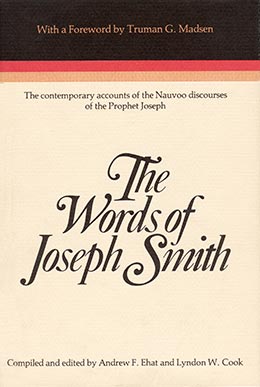29 November 1843 (Wednesday Afternoon)
[1] Joseph Smith, the Mayor, made some remarks, and his Appeal to the Green Mount Boys [2] was read by William W. Phelps. [3]
P. P. Pratt offered to deliver the president's appeal to the "Green Mountain Boys" to all the large towns in New York if he could have a copy. The President offered a copy, and it was voted that Elder Pratt shall have the mission granted him, and voted in addition that he go to all the towns in Vermont….
The Mayor spoke; said he rose to make a confession, that he used all his influence to prevent the brethren from fighting when mobbed in Missouri. If I did wrong I will not do so any more. It was a suggestion of the head, he would never do so again, but when the Mobs came upon you, kill them; I never will restrain you again but will go and help you….
Mayor spoke again if I do not stand with those who will stand by me in the hour of trouble and danger, without faltering I give you leave to shoot me.
Mayor read a letter in reply to one he wrote to Henry Clay [4]….
Motioned by Joseph Smith that every man in the meeting who could wield a pen write an address to his mother country—carried
Mayor read the Memorial to Congress [5]—The State rights doctrine are what feed mobs,—they are a dead carcass, a stink and they shall ascend up as a stink offering in the nose of the Almighty.
They shall be oppressed as they have oppressed us, not by Mormons but by others in power, they shall drink a drink offering, the bitterest dregs not from the Mormons but from a meaner source than themselves. God shall curse them.
Adjourned till next Monday evening early candle light.
Joseph Smith Diary, by Willard Richards
4 P.M. A meeting of citizens at the assembly room to appoint a committee to get subscribers to the memorial &c Joseph present.
—29 November 1843
Notes
[1] See History of the Church, 6:88, 93-95. Not in Teachings.
[2] The Green Mountain Boys had been formed in 1770 by settlers in present-day Vermont. Commanded by Ethan Allen, they sought to protect their land holdings from claim by New York. The regiment fought in the American Revolution.
[3] William W. Phelps (1792-1872) was baptized in 1831 and remained a prominent Church leader until 1838, often assisting with the printing of Church literature. In Nauvoo, after being rebaptized because of apostasy, Phelps remained close to the Prophet and assisted him in several writing endeavors.
[4] Henry Clay (1777-1852). Clay was a U.S. statesman with whom Joseph Smith corresponded in 1843 and 1844. Since Clay was a candidate for the presidency, the Prophet asked him what his "rule of action" would be towards the Mormon people if he were elected. See History of the Church, 6:64-65 and 376-77.
[5] The memorial referred to is published in History of the Church, 6:84-88. Colonel John Frierson, political representative of John C. Calhoun, agreed to present the memorial for a redress of Missouri grievances to Congress in exchange for Mormon support of Calhoun in his presidential bid.
